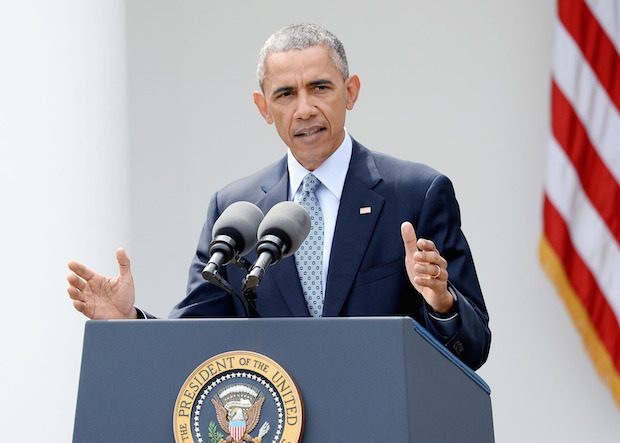Obama’s Speech on the Nuclear Deal

Obama delivered a very cogent and combative case for the nuclear deal with Iran earlier today at American University. He offered a clear and persuasive explanation of the deal’s merits and dismantled various criticisms of the deal quite effectively. This was obviously not aimed at trying to win over members of the other party, since it was already clear that Republicans in Congress are virtually unanimous in their opposition and aren’t going to change their position for anything. His responses to hawkish criticisms of the deal were pointed and sometimes mocking, which is understandable given how shoddy the arguments against the deal typically are. The speech seems to have been aimed primarily at fence-sitting Democrats in Congress and members of the public that don’t yet have a definite view of the deal. It was another reminder that Obama is particularly interested in non-proliferation and arms control issues and that he is willing to pursue them aggressively.
There were a few things from the speech that stood out. One was Obama’s emphasis on the fact that the U.S. is giving up nothing as part of this deal except the punitive measures imposed on Iran over the nuclear issue. He compared this deal with Cold War-era arms control treaties to make the point that the latter imposed limitations on the U.S. and were somewhat riskier than the current deal. The implicit argument here was that these arms control treaties were also the right thing to do, and the deal is even more obviously so. Another striking part of the speech was how uncompromising Obama was in his conviction that the deal is clearly the best available option:
I’ve had to make a lot of tough calls as president, but whether or not this deal is good for American security is not one of those calls, it’s not even close.
I would agree that it’s “not even close” to being a difficult decision, but I didn’t expect to hear that. Obama also countered hawkish alarmism about the “windfall” Iran will receive from sanctions relief by stating that Iran would be getting sanctions relief anyway in the absence of a deal or in the event that the deal was rejected, and he dismissed fears of Iran’s regional dominance by correctly pointing out the regime’s relative military weakness. He also repeatedly reminded the audience that Iran belongs to the Non-Proliferation Treaty and will always be barred from building a nuclear weapon. This is a very relevant detail that strangely goes unmentioned in much of the debate over the deal.
All in all, the speech was well done and made a strong case for the deal. It also had some flaws and false notes. In order to make the deal seem more significant, Obama indulged in his own threat inflation about the danger that an Iranian nuclear weapon would pose. He may think this is a necessary selling point, but it reinforces the bad assumption that a nuclear-armed Iran would be unusually menacing. Because he was trying near the end to make the “pro-Israel” case for the deal, he also made a nuclear-armed Iran seem like more of a danger to Israel than it really would be, and that meant he omitted any mention of Israel’s nuclear arsenal. I didn’t really expect him to mention it, but the omission made that part of the speech much harder to take seriously. He referred to his record of ordering the use of force to dispel the impression that military action would never be an option, but at the same time tried to present himself as if he were a reliable opponent of waging unnecessary wars. That simply isn’t true, and no one paying attention to his record is going to buy that. At one point, Obama said, “The only certainty in war is human suffering, uncertain costs, unintended consequences.” This is undoubtedly true, but coming from the president who has launched two wars and supports a third one in Yemen I found this rhetoric to be completely empty.